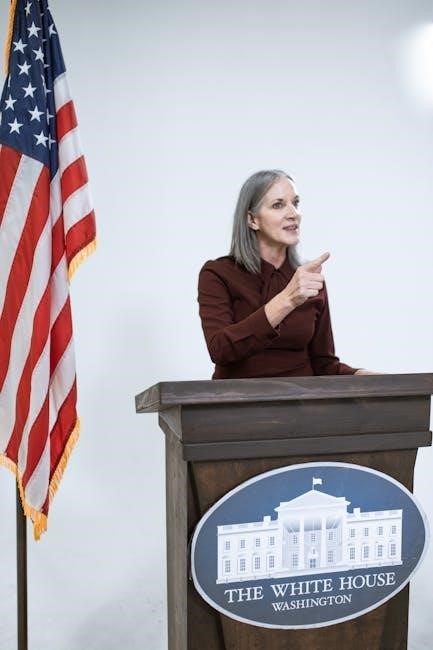
George Washington’s Farewell Address‚ published in 1796‚ marks a pivotal moment in U.S. history. It emphasizes national unity‚ warns against sectionalism‚ and advises on foreign policy‚ while its Farewell Address analysis worksheet PDF serves as an educational tool for understanding his visionary leadership and enduring legacy.
1.1 Historical Context of the Farewell Address
George Washington delivered his Farewell Address in 1796‚ nearing the end of his second presidential term. The nation faced challenges‚ including sectional divisions‚ economic struggles‚ and foreign threats. Washington’s decision not to seek a third term was unprecedented‚ setting a crucial precedent for peaceful transitions of power. The address reflected his concerns about party polarization and foreign entanglements‚ urging unity and moral integrity. This document‚ analyzed in educational tools like the Farewell Address analysis worksheet PDF‚ remains a cornerstone of American political thought‚ offering timeless lessons for future generations.
1.2 Purpose of the Farewell Address
George Washington’s Farewell Address aimed to provide guidance for the nation’s future‚ emphasizing unity‚ morality‚ and prudent leadership. He sought to prevent political divisions and warned against sectionalism‚ foreign entanglements‚ and the rise of political factions. The address also established the precedent of a two-term presidency. Its purpose was to leave a lasting legacy‚ offering wisdom for generations to come. Educational resources‚ such as the Farewell Address analysis worksheet PDF‚ help students explore these themes‚ ensuring Washington’s principles remain relevant in understanding American governance and leadership.

Key Themes in the Farewell Address
The address highlights national unity‚ warns against sectionalism‚ and provides guidance on foreign policy‚ political parties‚ and moral integrity‚ as explored in the Farewell Address analysis worksheet PDF.
2.1 The Importance of National Unity
Washington’s Farewell Address underscores the critical importance of national unity‚ advocating for a cohesive America free from sectional divisions. He warns against regional identities undermining the federal government and national interests. The Farewell Address analysis worksheet PDF highlights how Washington’s emphasis on unity remains relevant‚ encouraging citizens to prioritize shared goals over partisan or geographic divides. This theme reflects his vision for a strong‚ unified nation capable of overcoming internal and external challenges‚ ensuring long-term stability and prosperity.
2.2 Dangers of Sectionalism
Washington’s Farewell Address vehemently warns against sectionalism‚ labeling it a significant threat to national unity. He cautions that regional divisions could escalate into violent conflicts‚ weakening the federal government and undermining the Republic. The Farewell Address analysis worksheet PDF emphasizes how sectionalism fosters narrow interests‚ eroding collective identity and stability. Washington advocates for a unified nation‚ urging citizens to transcend regional loyalties and prioritize the common good. His warnings remain relevant today‚ as sectionalism continues to pose challenges to national cohesion and democratic governance.
2.3 Foreign Policy and Non-Entanglement
In his Farewell Address‚ Washington stressed the importance of avoiding entanglements with foreign nations‚ advocating for a policy of non-intervention. He warned against forming permanent alliances‚ emphasizing the need for neutrality to safeguard national interests. The Farewell Address analysis worksheet PDF highlights his belief that foreign conflicts could destabilize the young nation and divert resources from domestic development. Washington’s approach remains a cornerstone of early U.S. foreign policy‚ prioritizing independence and self-reliance. His counsel continues to resonate‚ offering timeless insights into balancing national sovereignty with global engagement.
2.4 The Role of Political Parties
Washington expressed deep concern about the rise of political parties‚ viewing them as threats to national unity. He feared that partisan divisions could lead to factionalism and undermine the government’s effectiveness. In his Farewell Address‚ he warned that political parties might prioritize power over the public good‚ leading to corruption and instability. The Farewell Address analysis worksheet PDF underscores his belief that excessive partisanship could weaken the republic. Washington advocated for a unified approach to governance‚ emphasizing the importance of putting national interests above party loyalty. His warnings remain relevant in modern politics‚ where partisan divides continue to shape the political landscape.
2.5 Moral and Ethical Guidance
George Washington’s Farewell Address emphasizes the importance of moral and ethical principles in governance. He urged citizens to uphold integrity‚ honesty‚ and religious faith‚ believing these virtues were essential for national stability. Washington warned against moral decay‚ which he saw as a threat to liberty and democracy. The Farewell Address analysis worksheet PDF highlights his belief in the interconnectedness of personal and public morality. He advocated for a society grounded in ethical behavior‚ ensuring the survival of republican ideals. Washington’s moral guidance remains a cornerstone of American leadership‚ inspiring future generations to prioritize character and principle in public life.

Analysis of Political Parties in the Farewell Address
Washington warned against the dangers of political factions‚ fearing they could lead to national division and undermine democracy. His concerns remain relevant today‚ as the Farewell Address analysis worksheet PDF helps students explore his critique of partisanship and its impact on governance.
3.1 Washington’s Warning About Political Factions
Washington warned against the dangers of political factions‚ emphasizing their potential to divide the nation and undermine its democratic foundations. He feared that excessive partisanship could lead to the erosion of national unity‚ as citizens prioritized party loyalty over the common good. Washington believed that political parties could foster sectionalism‚ creating deep divisions between different regions and interests; His concerns were rooted in his belief that a unified America was essential for long-term prosperity and stability. The Farewell Address analysis worksheet PDF highlights these warnings‚ urging readers to reflect on the balance between party loyalty and national unity in modern governance.
3.2 The Rise of the Two-Party System
Despite Washington’s warnings about political factions‚ the U.S. eventually developed a two-party system. Early divisions between Federalists and Democratic-Republicans laid the groundwork for this structure. Over time‚ political parties became integral to American governance‚ shaping elections‚ policy-making‚ and voter alignment. Washington’s concerns about partisanship were prescient‚ as parties often prioritize power over unity. The Farewell Address analysis worksheet PDF invites reflection on how Washington’s fears materialized and how the two-party system influences modern politics‚ balancing representation with potential divisiveness. This evolution underscores the enduring relevance of Washington’s cautionary words.
3.3 Relevance of Washington’s Concerns Today
Washington’s concerns about political parties and foreign entanglements remain strikingly relevant today. The U.S. faces deep partisan divides‚ echoing his warnings about factionalism undermining national unity. Modern foreign policy challenges‚ such as balancing alliances and avoiding conflicts‚ reflect his caution against overextending international commitments. The Farewell Address analysis worksheet PDF helps students connect these 18th-century themes to contemporary issues‚ demonstrating how Washington’s insights continue to resonate in an increasingly polarized political landscape. His legacy serves as a reminder of the importance of bipartisanship and prudent diplomacy.

Foreign Policy and National Interests
Washington’s Farewell Address emphasizes avoiding foreign entanglements and maintaining neutrality to protect national interests. His principles‚ analyzed in the Farewell Address analysis worksheet PDF‚ remain relevant today.
4.1 Avoiding Entanglements with Foreign Nations
Washington’s Farewell Address strongly cautioned against entanglement in foreign alliances‚ advocating for neutrality to safeguard national interests. He believed young America should focus on internal development rather than European conflicts. This principle‚ explored in the Farewell Address analysis worksheet PDF‚ reflects his desire to protect the nation from external pressures and maintain independence. His warnings remain relevant today‚ emphasizing the importance of strategic foreign policy to preserve sovereignty and avoid unnecessary conflicts‚ aligning with the worksheet’s goal of fostering critical analysis of his visionary leadership.
4.2 The Importance of Neutrality
Washington emphasized neutrality as a cornerstone of U.S. foreign policy‚ urging avoidance of permanent alliances to maintain independence and sovereignty. He believed neutrality would foster peace‚ economic growth‚ and moral authority. The Farewell Address analysis worksheet PDF highlights this principle‚ illustrating its relevance to modern diplomacy. Washington’s stance on neutrality underscores his commitment to preventing external influence from undermining national interests‚ ensuring America’s freedom to act based on its values rather than foreign obligations. This philosophy remains a foundational aspect of U.S. diplomatic strategy‚ as explored in the worksheet’s analysis of his address.
4.3 Modern Implications of Washington’s Foreign Policy
Washington’s foreign policy principles‚ such as avoiding entanglements and maintaining neutrality‚ hold modern relevance in navigating global conflicts and alliances. The Farewell Address analysis worksheet PDF explores how his warnings about foreign influence resonate today‚ especially amid rising nationalism and geopolitical tensions. Washington’s emphasis on prioritizing national interests aligns with contemporary debates over isolationism versus interventionism. His philosophy encourages a balanced approach‚ ensuring U.S. sovereignty while engaging strategically with the world. This timeless advice remains crucial for addressing modern challenges‚ as analyzed in the worksheet’s examination of his address.
Worksheet Analysis of the Farewell Address
The Farewell Address analysis worksheet PDF is an educational tool designed to explore the structure and key themes of George Washington’s speech‚ enhancing understanding of its historical and modern significance.
5.1 Document Type and Structure
The Farewell Address analysis worksheet is a primary source analysis tool‚ typically adapted from educational resources like the National Archives. It guides students to identify the document type‚ such as a speech or letter‚ and analyze its structure‚ including introductions‚ key themes‚ and conclusions. The worksheet often includes sections for highlighting significant phrases‚ restating ideas in their own words‚ and reflecting on the document’s historical context. This structured approach helps learners engage deeply with Washington’s message‚ making it an invaluable resource for understanding the Address’s enduring relevance and its impact on American history and governance.
5.2 Key Phrases and Sentences
The worksheet directs students to identify and analyze key phrases from Washington’s address‚ such as warnings about political factions and foreign entanglements. These phrases are crucial for understanding his philosophy. By restating these sentences in their own words‚ students grasp the core ideas‚ like the importance of national unity and the dangers of sectionalism. This exercise helps learners connect Washington’s 18th-century concerns to modern political challenges‚ fostering critical thinking and historical insight. The focus on specific language highlights how Washington’s words remain relevant in shaping American governance and civic values today.
5.3 Restating Washington’s Philosophy
The worksheet requires students to restate Washington’s key ideas in their own words‚ ensuring a deep understanding of his principles. This section focuses on paraphrasing his warnings about political parties‚ sectionalism‚ and foreign policy. By restating his philosophy‚ students connect his 18th-century views to modern issues‚ fostering critical thinking. This exercise highlights Washington’s emphasis on national unity‚ moral integrity‚ and the importance of avoiding foreign entanglements. It encourages learners to reflect on the timeless relevance of his advice and its enduring impact on American governance and civic responsibility.

Historical and Modern Relevance
Washington’s Farewell Address remains a landmark document‚ guiding America’s future and reflecting timeless principles. Its analysis worksheet helps explore its themes‚ such as unity and foreign policy‚ and their modern relevance today.
6.1 The Farewell Address as a Founding Document
George Washington’s Farewell Address is a cornerstone of American history‚ shaping the nation’s identity and governance. It serves as a foundational document‚ offering timeless wisdom on unity‚ leadership‚ and moral integrity. The address is deeply intertwined with the nation’s values‚ providing guidance for future generations. Its principles‚ such as avoiding political extremism and maintaining neutrality in foreign affairs‚ continue to resonate today. As a teaching tool‚ the Farewell Address analysis worksheet PDF helps students explore its historical significance and relevance to modern challenges‚ ensuring its enduring impact on American political thought and culture.
6.2 Comparing 18th Century and Modern America
While 18th-century America faced challenges of unity and foreign interference‚ modern America grapples with similar issues but on a global scale. Washington’s warnings about political partisanship and sectionalism remain relevant today‚ as polarization divides the nation. The Farewell Address’s emphasis on neutrality in foreign affairs contrasts with modern America’s role as a global superpower‚ often entangled in international conflicts. Despite these differences‚ the core principles of national unity and moral leadership endure. The Farewell Address analysis worksheet PDF helps students bridge historical and contemporary contexts‚ highlighting the timeless relevance of Washington’s insights for understanding America’s evolution and ongoing challenges.
6.3 Timeless Lessons from Washington’s Address
George Washington’s Farewell Address offers enduring lessons that transcend time. His emphasis on national unity‚ moral integrity‚ and the dangers of political partisanship remains relevant today. The address underscores the importance of putting country over party‚ a principle increasingly challenged in modern politics. Washington’s warnings about foreign entanglements resonate in an era of global interdependence. The Farewell Address analysis worksheet PDF invites reflection on these themes‚ encouraging readers to apply Washington’s wisdom to contemporary issues. His legacy reminds Americans of the importance of ethical leadership and the need to balance progress with foundational values.

Precedents Set by Washington
Washington set vital precedents‚ including voluntary retirement after two terms and avoiding a third term‚ establishing democratic norms. His moral integrity and selfless leadership remain exemplary.
7.1 Voluntary Retirement from Power
George Washington’s decision to retire voluntarily after two terms was a groundbreaking precedent‚ shaping the foundation of U.S. democracy. By declining a third term‚ he defied the trend of lifetime leadership common in monarchies and established the principle of peaceful transfer of power. This selfless act highlighted his commitment to republicanism and constitutional governance. It underscored the idea that the presidency is not a position for personal aggrandizement but a service to the nation. Washington’s Farewell Address emphasized this principle‚ ensuring its enduring influence on American political culture and leadership traditions.
7.2 Establishing Two-Term Tradition
George Washington’s decision to serve only two terms as president set a precedent that shaped U.S. governance. By voluntarily stepping down‚ he avoided the risk of the presidency becoming a lifelong position‚ common in monarchies. This self-imposed limit demonstrated his commitment to republicanism and prevented the concentration of power. Washington’s example became a cornerstone of American democracy‚ influencing future leaders and eventually being codified in the 22nd Amendment. His leadership established a tradition of peaceful transitions‚ reinforcing the principle that the presidency is a temporary service to the nation rather than a permanent office.
7.3 Leadership and Moral Integrity
George Washington’s Farewell Address exemplifies his leadership and moral integrity‚ as he prioritized the nation’s interests over personal ambition. By voluntarily stepping down after two terms‚ he demonstrated a commitment to republican principles and set a precedent for future leaders. His address emphasized ethical governance‚ unity‚ and the avoidance of corruption. Washington’s moral stance and selflessness provided a foundation for the nation’s development‚ showcasing the importance of integrity in leadership. The Farewell Address analysis worksheet PDF highlights these qualities‚ allowing students to explore how Washington’s example continues to influence American democracy and leadership ideals.
George Washington’s Farewell Address remains a cornerstone of American history‚ offering timeless lessons on unity‚ leadership‚ and moral integrity. Its relevance endures‚ guiding future generations through its wisdom.
8.1 Summary of Key Ideas
George Washington’s Farewell Address emphasizes national unity‚ warns against sectionalism‚ and advises caution in foreign affairs. It critiques political factions‚ urging moral leadership and ethical governance. The address‚ analyzed through worksheets‚ highlights Washington’s vision for a unified America‚ avoiding foreign entanglements‚ and the dangers of partisanship. His warnings remain relevant‚ offering timeless lessons on leadership and national integrity. The document underscores Washington’s legacy as a unifying figure‚ establishing precedents like voluntary retirement and peaceful power transfer‚ shaping America’s future.
8.2 Lasting Impact of the Farewell Address
George Washington’s Farewell Address has left an indelible mark on American history and governance. Its emphasis on national unity‚ moral integrity‚ and cautious foreign policy continues to influence political discourse. The document established key precedents‚ such as the two-term presidency and peaceful power transfer‚ shaping U.S. democracy; Its warnings about political factions and sectionalism remain relevant‚ sparking ongoing debates about partisanship. Educational tools‚ like the Farewell Address analysis worksheet PDF‚ ensure its teachings endure‚ making it a foundational text for understanding American leadership and identity.
8.3 Final Thoughts on Washington’s Legacy
George Washington’s Farewell Address remains a cornerstone of American political philosophy‚ reflecting his commitment to unity and moral leadership. His warnings about partisanship and foreign entanglements continue to resonate‚ offering timeless wisdom for modern governance. The Farewell Address analysis worksheet PDF ensures his ideas are studied and applied‚ preserving his legacy as a founding father of democracy. Washington’s voluntary retirement and ethical standards set a precedent for future leaders‚ cementing his role as a symbol of integrity and vision. His legacy endures as a blueprint for leadership and national identity.